Patrick Chan: "My job isn't to judge or argue about my points, my job is to go out and produce something beautiful."
October 28, 2012
By Titanilla Bőd
Photo © Absolute
Skating
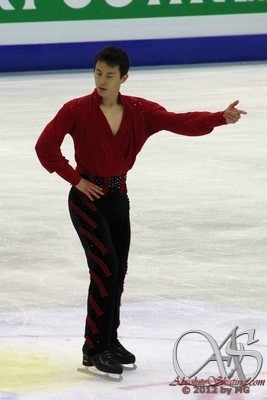 Sitting on an ice bag he willingly answered every single question, spending more than an hour with the journalists. Patrick Chan of Canada didn't act like a superstar in Nice after winning his second world gold medal; and, even if the official press conference was already over, he didn't turn down any reporter. Absolute Skating was also there and asked Patrick some questions.
Sitting on an ice bag he willingly answered every single question, spending more than an hour with the journalists. Patrick Chan of Canada didn't act like a superstar in Nice after winning his second world gold medal; and, even if the official press conference was already over, he didn't turn down any reporter. Absolute Skating was also there and asked Patrick some questions.
What was harder, to win the title for the first time, or to defend it?
To defend a title is much harder. It's a unique situation. I had a very good season so I was almost expected to defend my title, so I felt the pressure in a certain way. So it wasn't as easy as last year. This time I didn't have as many points in the lead after the short program; I had to concentrate very much. I had to remind myself to keep concentrating on my own performance, not the other skaters'. It was a position I really learned a lot from.
What did you think after your fall on the double Axel at the end of your long program? Were you sure that you'd done enough for the gold?
I knew it was enough. I knew I'd earned enough points so far. It wasn't a perfect skate, but it was smart and good enough to get those little points here and there. And we all make mistakes. It just shows we are human.
Some people say that you are sometimes over-scored. How would you comment on that?
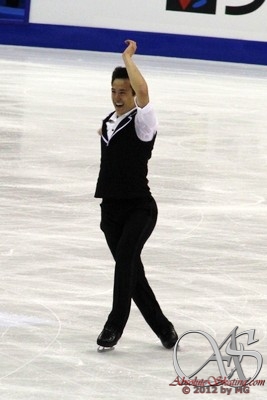 I can't really give you a good answer on that. I just go out and skate. My job isn't to judge or argue about my points, my job is to go out and produce something beautiful, something that the judges can understand, to make them feel something. It's too quick to judge, point fingers and say I'm maybe over-marked. You have to look at the details. If you really understand skating, you can look at the way certain skaters skate and can compare. Instead of making a judgment, study the little details over and over. For me it's just a joy to skate, and draw the judges and the audience [into the performance]. It's just a really cool position to have that power.
I can't really give you a good answer on that. I just go out and skate. My job isn't to judge or argue about my points, my job is to go out and produce something beautiful, something that the judges can understand, to make them feel something. It's too quick to judge, point fingers and say I'm maybe over-marked. You have to look at the details. If you really understand skating, you can look at the way certain skaters skate and can compare. Instead of making a judgment, study the little details over and over. For me it's just a joy to skate, and draw the judges and the audience [into the performance]. It's just a really cool position to have that power.
You are only halfway to the Olympics. You are on the top now, but what do you need to do to stay there until Sochi as well?
Trying new things – new music, new programs, maybe a new choreographer - and also improving technically. There are a lot of things I can work on. Even if I defended my title, it wasn't a walk in a park, it wasn't easy. Each competition is different. I'm excited to work on something new.
What was it like for you to skate in France?
I love the way the French live. Also the location is very beautiful, the mountains and the ocean. I really enjoyed Nice. I hope to come back soon, not for skating, just to enjoy myself. Luckily I speak French, so I can communicate and enjoy the culture.
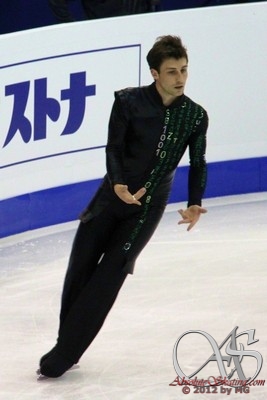 A few years ago you had some controversy with the home crowd's favourite Brian Joubert concerning quad jumps. What about your current relationship with the French skaters?
A few years ago you had some controversy with the home crowd's favourite Brian Joubert concerning quad jumps. What about your current relationship with the French skaters?
It's great. I always get along with Florent and Brian, despite some dissidences maybe years ago. It was such a long time ago that we've both matured obviously. We've been in the sport for a long time and we don't have time to argue about unnecessary things. We get along great.
Other journalists also bombed Patrick with questions, and he said a lot of interesting things. So here is the transcript of those questions and answers.
You seemed a bit tired during the last part of your long program. What was the reason for that?
I had rough week prior to leaving. There were a couple of days when I showed up at the rink, had a bad session and I was so frustrated that I just went home. Then I decided that I could do more if I wasn't planning doing four run-throughs every day - instead only do sections of the program, training more in the European way. I think this might be the reason why there wasn't as much energy cardio-wise at the end of the program as at other competitions of the season. Daisuke also mentioned that he felt tired and some of the pair skaters as well. So maybe it was the air, maybe the extra excitement and the audience. But you can't always have the perfect environment, the perfect situation. I think this is a skill I have to acquire going to the Olympics. Maybe I won't have a nice week of training in altitude, and I still have to cope with it.
You almost crashed into the boards after one combination. What happened?
It was an instinct that I pulled my leg back. It h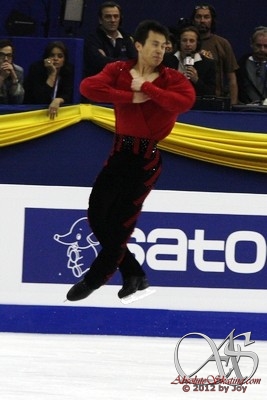 appens to me sometimes, also in Colorado when I skate on the Olympic rink that I run out of ice, so I'm used to this movement. It's a kind of shortcut so that my leg doesn't go wide. It's just muscle memory; it's impressive that your body can do such things.
appens to me sometimes, also in Colorado when I skate on the Olympic rink that I run out of ice, so I'm used to this movement. It's a kind of shortcut so that my leg doesn't go wide. It's just muscle memory; it's impressive that your body can do such things.
Why did you put the triple toe after your second quadruple toe-loop and not the first jump?
It's just the same scenario as in the short program [when the first quad toe is not that good, he doesn't risk the combination]. I felt in the air that the first quad toe wasn't perfect, but I landed it, so I said, ‘huh, good!' The second one was much better. Usually the second quad is better, because I can fix a lot of things like that [correcting the wrong things from the first quad]. It's not something I do consciously, my body does it.
You skated last in the long program. Were you aware how the others were doing?
When Daisuke went on the ice, I started to do my warm-up and I put in my earphones. Until then I knew Yuzuru had skated really well and he was in the lead. This place is not really isolated, so you can hear absolutely every little thing, so I had some idea how Daisuke, Michal and the others skated, but I didn't know any details and the scores. I just knew just as last year: if I go out and put out a product, even only 90 % of what I do every day in training, I'll be okay. I knew I just had to put out a strong opening and there was my focus. From then on it is more about using the momentum and keeping it going. And it worked.
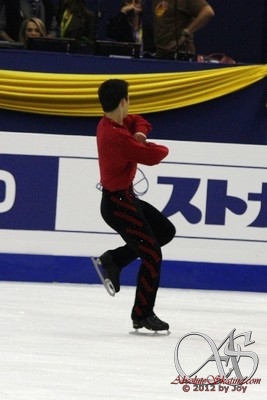
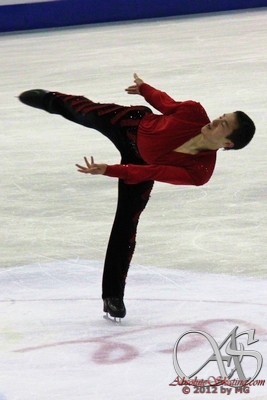
When you finished your program, were you happy or were you doubtful about your victory?
I was not doubtful, I was upset or disappointed that I made that mistake on the double Axel [he fell on it]. That program, that last section just flows so well, and I completely broke the flow of the program. And I knew that this was going to be on the highlights and this won't look great. It's just one of those little nitpicky things I wish I hadn't done. Next year there will be a new product and that will be just as inspiring but this is one of my favourite programs and especially that section is awesome. So hopefully I got up quick enough so the people won't really remember.
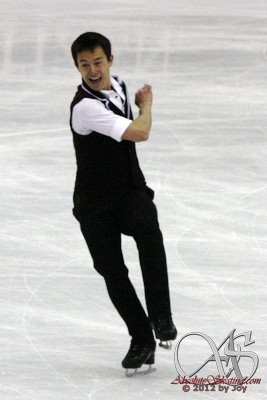 How would you overall describe your long program?
How would you overall describe your long program?
It was unique (says ironically with a smile). But it was smart skating, it was not extravagant. Mistakes here and there show that I'm human. I left the field open in the short and in the long program as well. It's interesting; I've given the others a lot of chances. And I've learnt a lot. Hopefully next time I won't slide like that again.
Did you know when you finished your program that you'd won?
Yes. I knew it when I got off the ice. After waiting for five skaters to finish their routine I had such a strong opening. During those forty minutes everything was planned perfectly. I lay down, had my legs up, then stood up, walked around, took my time, ate a little bit to keep my energy and my blood sugar up. It worked out well, I felt really good and relaxed. It's always been kind of a worry behind my mind: what if I end up in that position again? What if I have a great short program, but I draw last at the Olympics? Or at the Worlds? So this was a big step for me that I could deal with it. I've been in this position before, but only now I've really learnt how to be comfortable in my skin in that position, skating last.
This is your second world title. Which one is more special for you?
I think the second one. As I said, I had a tough week before the Worlds, I would say I almost wanted to quit. It was a very unique situation coming to Nice and putting that behind me. I had doubts. But I just trusted myself. I knew I had trained hard enough all season long and done all the right things, little details that lead to success.
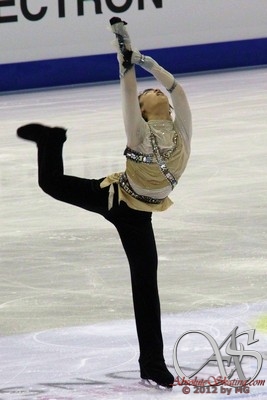 What were your thoughts when you saw how Yuzuru Hanyu skated? Something like ‘Oh, my, I'll have a tough rival in Sochi”?
What were your thoughts when you saw how Yuzuru Hanyu skated? Something like ‘Oh, my, I'll have a tough rival in Sochi”?
Skating, especially in the new system is a lot more than just jumping. The Japanese skaters are always technically strong. They are better than me, better than anybody. But there is also that feeling which gives you the spark. You want the audience to say at the end of your program: “Oh, is it over already?” That's the feeling you want to have. I think I may have an edge on that end. Of course I'm constantly trying to get better. If I look at the videos of this season and the previous one, I can see how I improved. That's what I want to see even in next season. Even if it's just a little detail, it's going to make a big difference.
Many coaches and former skaters agreed that there was no doubt about your victory, but it seemed that the audience a little bit disagreed with the result. What was it like for you to hear them?
This is has been such a long season shared with many people. I know that the people who follow skating as much as I do, every day, over and over, understand how much work it took to get to this point. I really didn't hear any of the negative boos. Maybe a couple of people were booing, but I'm glad that they came here and watched skating even if they may have not liked the results.
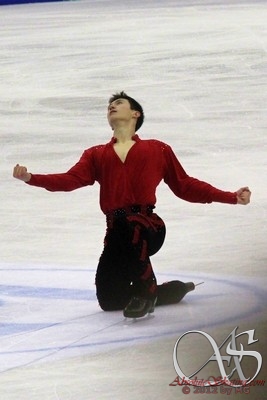 The long program in Nice was on the birthday of your former coach, Mr. Osborne Colson, who passed away in 2006. Did you think of him when you finished your routine?
The long program in Nice was on the birthday of your former coach, Mr. Osborne Colson, who passed away in 2006. Did you think of him when you finished your routine?
I was more emotional going into the ice, before I even started my program, but it ended up being a good thing. Mr. Colson brought me to where I am, he started everything. And he kind of foresaw this all [winning the world title] was going to happen to me one day. His memory really helped me. I didn't feel worried or nervous, I just felt calm, like nothing else matters, forgetting the other skaters, the audience, the media. I was just doing it for myself, I started off with big two quads. Mr. Colson guided me when I was a child and he kind of guided me today. Just thinking about him and the fact that it was his birthday helped me to forget about being nervous. Even though he was such a tough coach at practice, when it came to competition and I had to step on the ice, he was always there. I could look at him and know everything is going to be fine. I kind of had the same feeling before I took to the ice in Nice.
After a coach change and a not so stellar beginning of the season at Japan Open, Patrick started the Grand Prix series with a silver medal won at Skate Canada.



